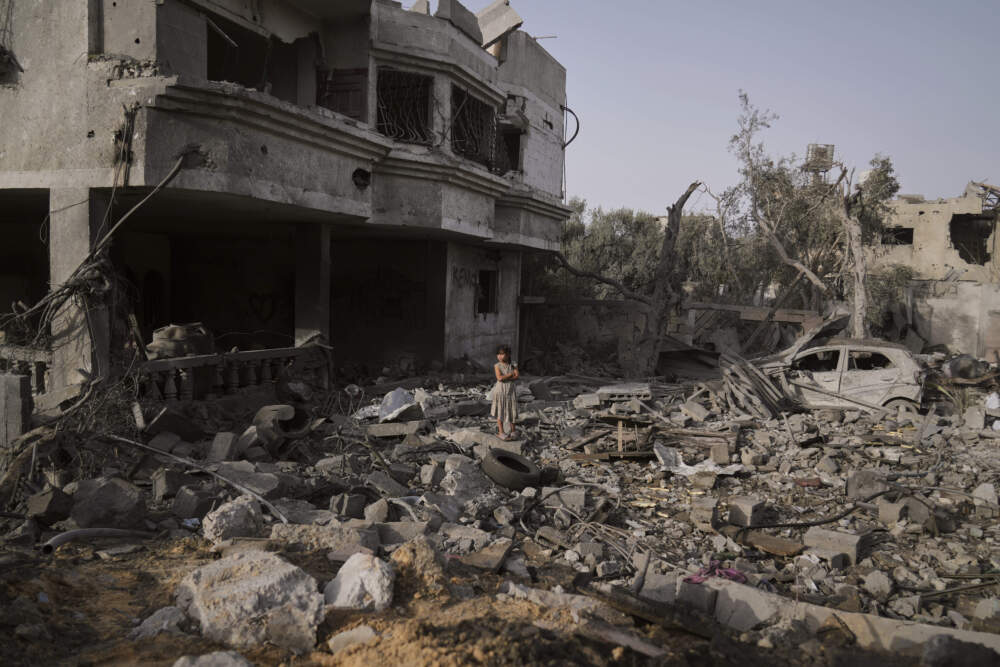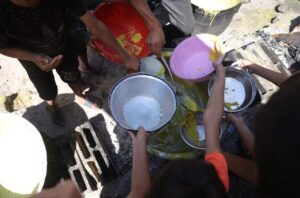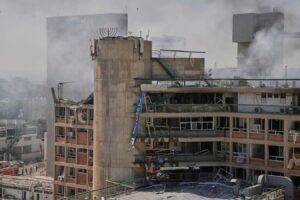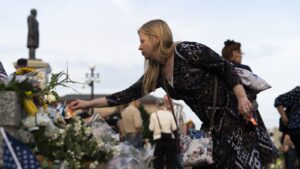
A Palestinian girl stands atop the rubble of the Al-Aimawi family's home that was destroyed by Israeli airstrikes in Al-Zawaideh, Gaza Strip, Tuesday, July 1, 2025. (AP Photo/Abdel Kareem Hana)
In the heart of Gaza, desperation has reached a fever pitch as residents risk their lives to secure basic necessities. The Gaza Humanitarian Foundation (GHF), supported by both the United States and Israeli governments, began distributing food at four sites across Gaza in late May. However, these sites have become perilous zones, with the United Nations reporting over 400 Palestinian deaths due to gunfire in and around these distribution points.
Dr. Adil Husain, an American emergency medicine physician from Dallas, recently returned from a two-week volunteer mission at Nasser Hospital in southern Gaza. His account of the situation paints a grim picture. “They’re weaponizing starvation to lure them in and kill them,” Husain remarked, describing the daily scenes as “apocalyptic.”
Humanitarian Crisis at Aid Distribution Sites
The distribution of aid, intended to alleviate suffering, has instead become a trigger for violence. According to Dr. Husain, mass casualty incidents have become a daily occurrence, often coinciding with the opening of these aid sites. “Even on my second day there, I woke up to the MCI alarm,” he recalled, describing the chaos of the emergency room filled with severely injured individuals.
Gunshot wounds are the most common injuries, often targeting the head, chest, and abdomen. Tragically, many victims are young boys and men, attempting to procure food for their families. “So many children are going out for their families to try to be the man of the house,” Dr. Husain noted, highlighting the heartbreaking reality of empty food bags found on injured children.
“Over 400 deaths in the food aid distribution sites in the past month. But what we don’t talk about is the hundreds of thousands of lives that have been changed forever.”
Personal Stories of Tragedy
Dr. Husain shared harrowing stories of the individuals he treated, including a 10-year-old boy shot through the face, now likely paralyzed. He also recounted the case of a pregnant woman who lost her child and her ability to conceive due to gunfire. “It haunts me every day,” he confessed, reflecting on the senseless violence.
The physician’s experiences underscore the broader humanitarian crisis. Many Palestinians express frustration not only with the immediate violence but also with the lack of support from neighboring countries. “They are really upset with the neighboring countries who have not let them in or not sent aid,” Dr. Husain explained.
The Resilience of Gaza’s People
Despite the dire circumstances, the people of Gaza exhibit remarkable resilience. “The resilience and the hope and the optimism of the people of Gaza is out of this world,” Dr. Husain observed. This spirit persists even amidst severe food shortages, with many adults and children suffering from malnutrition.
“Starvation is manmade. The baby formula is just miles away at the border. It’s just not being let in.”
Dr. Husain’s personal connection to the crisis is palpable, especially as a father himself. “The cases that really hit me were the pediatric cases,” he admitted, recalling the tragic deaths of malnourished children like Hassan, a three-year-old who weighed only six kilograms.
Calls for International Attention
The ongoing conflict and humanitarian crisis in Gaza demand urgent international attention. Dr. Husain’s testimony serves as a powerful call to action for world leaders and humanitarian organizations. “I just pray that the government officials, the world leaders, hear this and see this and try to make change because it’s a humanitarian issue at the end of the day,” he urged.
As the situation in Gaza remains precarious, the global community faces a moral imperative to address the suffering and prevent further loss of life. The stories emerging from Gaza are a stark reminder of the human cost of conflict and the urgent need for peace and humanitarian intervention.







